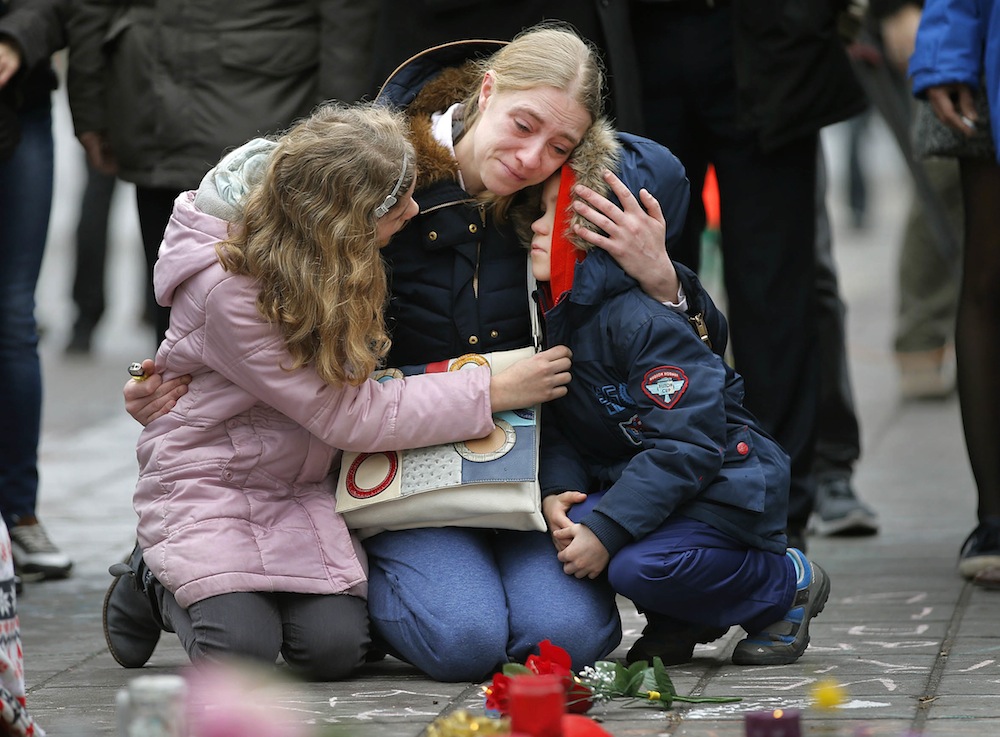Solidarity: The Eiffel Tower in Paris is lit up in the black
European leaders and the public reacted to the Brussels attacks with a show of solidarity, support and celebration of all things Belgian, from Tintin to chips to the famous Manneken Pis statue.
The most emphatic response came from Paris, target of the last major attack in Europe in November. The city’s mayor, Anne Hidalgo, said the Eiffel Tower would be lit up in the colours of the Belgian flag, echoing the gesture when the French tricolour was projected on public monuments around the world last year.
President François Hollande declared his personal solidarity with the Belgian people, adding that when Brussels was attacked, “it is all of Europe that is hit”.
France’s prime minister, Manuel Valls, declared the continent was “at war”. “We have been subjected for the last few months in Europe to acts of war,” Valls said.
Le Monde’s veteran cartoonist, Jean Plantureux, better known as Plantu, produced a picture of a figure in a French flag consoling his Belgian counterpart, both of them weeping. Valls shared the image on Twitter.
In the United Kingdom, David Cameron criticised attempts to use the attacks as arguments in the June referendum on European Union membership and stressed the need for a collective response to a shared threat.
The prime minister said: “We absolutely stand with them at this very difficult time. These were attacks in Belgium. They could just as well be attacks in Britain or France or Germany or elsewhere in Europe, and we need to stand together.”
As was the case with the French tricolour after November’s Paris attacks, a Belgian flag was flown over Downing Street.
In Berlin the German foreign minister, Frank-Walter Steinmeier, said: “In these dark hours, Europe stands together in solidarity. Belgium is not alone.” Angela Merkel’s chief of staff, Peter Altmaier, tweeted: “Our European values much stronger than hate, violence, terror!”
In a telegram to the archbishop of Mechelen-Brussels, Pope Francis said he “expresses his deepest sympathy to the injured and their families, and all those who contribute to relief efforts, asking the Lord to bring them comfort and consolation in this ordeal”.
“The Holy Father again condemns the blind violence which causes so much suffering and, imploring from God the gift of peace, he entrusts on the bereaved families and the Belgians the benefit of divine blessings.”
Tears, real and symbolic, ran throughout the day. The EU’s foreign policy chief, Federica Mogherini, broke down while giving her reaction during a trip to Jordan. Unable to continue, she told the Jordanian foreign minister, Nasser Judeh: “I will stop here; you will understand this, today is a difficult day.” When Judeh began to offer his condolences, she cut him off and embraced him, and he helped lead Mogherini out of the press conference.
Pictures of Tintin, the boy reporter hero of the comic strip by Hergé, spread rapidly around the web, as people sought an embodiment of the country. Most showed Tintin weeping or lying unconscious with his dog, Snowy, howling over him, or on a motorbike pursuing his adversaries.
Elsewhere it was chips, the Belgian staple, that served as a national symbol. One picture showed a bag of fries that looked like a human hand, the middle finger raised. Another image showed a bag of chips held aloft as if by the Statue of Liberty.
Brussels’s most famous landmark, the Manneken Pis statue (the peeing boy) was depicted urinating on a Kalashnikov assault rifle, the type of gun used in the Paris attacks and found in the wreckage at Brussels airport. – © Guardian News & Media 2016

A woman is consoled by her children at a street memorial in the Belgian capital. (Vincent Kessler/Reuters)